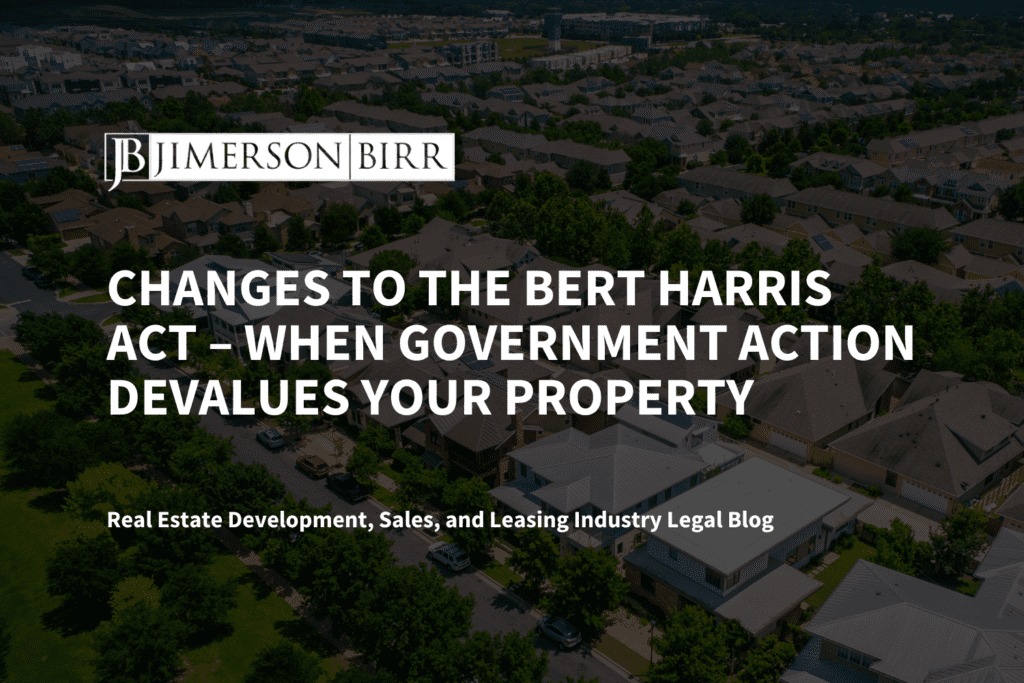The Bert Harris Act was enacted in 1995 by the Florida Legislature in response to concerns that governmental regulations and actions could unfairly diminish the value of private property without providing just compensation to the property owners. See Section 70.001, Florida Statutes. The Act addresses situations that may not rise to the level of a “Taking” under the Florida Constitution or the U.S. Constitution.
The main purpose of the Bert Harris Act is to provide property owners with a means to seek compensation when government actions result in a “taking” of their property rights without the need for eminent domain proceedings. All property owners should understand the recent changes to this impactful statute in Florida.
Proving a Bert Harris Claim
The elements of a Bert Harris Claim are as follows:
- A “property owner” is a person who holds legal fee title to the property at issue;
- Who meets the presuit requirements of the Act;
- Demonstrates an action of a government entity;
- That imposes an inordinate burden on an existing use or a vested right; and
- Leads to a “loss in value” of the property.
Recent Changes to the Bert Harris Act
Definitions
Foremost, there were several changes to the definitions to provide more clarity, and those changes were reflected in the Florida Land Use and Environmental Dispute Resolution Act (“FLUEDRA”). The term “action of a governmental entity” was revised to include adoption or enforcement of any “ordinance, resolution, regulation, rule, or policy.” Further, the term “real property” was revised to include “any surface, subsurface, or mineral estates.”
Procedural Changes
Prior to the revisions, property owners were required to provide the government with notice at least 150 days prior to filing a claim. That time period has been reduced to 90 days. Further, written settlement offers are presumed to protect the public interest. The changes apply to all government actions taken on or after July 1, 2021.
Standing to Assert Claim
A property owner is entitled to relief even if that property owner transfers legal title to the property prior to the conclusion of the proceedings.
Substantive Changes
There were several substantive changes that impact the implementation of the rights afforded by the Bert Harris Act. First, a court, rather than a jury, may determine damages in the claim. The statue further extended the time period from which a prevailing party may recover attorneys’ fees and costs. The statue allows a property owner to seek injunctive relief to declare a prohibited exaction as invalid, and the property owner is not required to exhaust all administrative remedies prior to filing suit to declare a prohibited exaction invalid.
Settlement and Mediation under FLUEDRA
Under FLUEDRA, an owner who believes an enforcement action or development order is unreasonable or unfairly burdens the use of the owner’s property may apply for a special magistrate hearing within 30 days after receipt of the order or notice. A FLUEDRA request can toll the time to challenge the government’s action. The special magistrate is required to conduct mediation or a hearing within 45 days of a FLUEDRA request, and the government must submit a written response prior to a hearing, which is informal and open to the public.
Once the special magistrate hears testimony in facilitation of a resolution of a land use conflict through mediation, the parties may resolve the matter or otherwise impasse. If the parties are unable to come to an agreement at mediation, the special magistrate will consider the facts and circumstances and decides as to whether the government action is unreasonable or unfairly burdens the property. The special magistrate must prepare a written recommendation within 14 days after the hearing. After the recommendation, the local government may accept, modify, or reject the recommendation, and this process must be completed within 165 days.
Conclusion
The Bert Harris Act aims to strike a balance between protecting property rights and the legitimate interests of government in regulating land use for public welfare. It provides property owners with a legal avenue to seek compensation if they believe their property rights have been unfairly restricted or diminished by government actions, without the need for the more formal eminent domain process. Property owners should be aware of their rights when a law or regulation devalues the highest and best use of property, and such owners should engage competent legal counsel to assist them in navigating these remedies.

